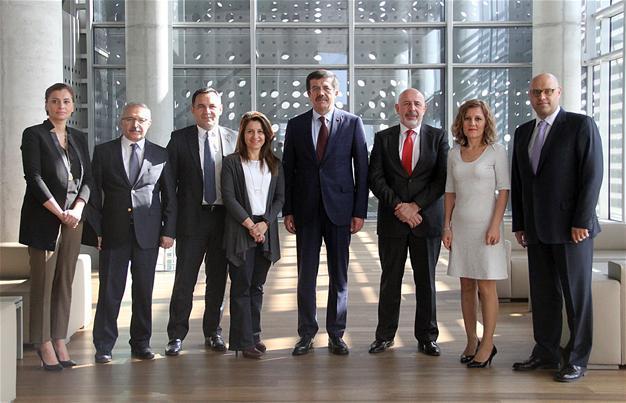Turkish economy overcome challenges, set to further grow: Minister
Serkan Demirtaş - ANKARA
 Turkey’s economy has overcome cyclical challenges emanating from regional and in-house political developments, the Turkish economy minister has said, vowing to implement the world’s most assertive incentive policies to push the private sector to produce and export more.
Turkey’s economy has overcome cyclical challenges emanating from regional and in-house political developments, the Turkish economy minister has said, vowing to implement the world’s most assertive incentive policies to push the private sector to produce and export more. “The Turkish economy has overcome challenges that have affected its performance. The world has also realized this positive trend in the Turkish economy,” Economy Minister Nihat Zeybekci told the Hürriyet Daily News on Oct. 21 in a visit to the Doğan Media Center in Ankara.
Four factors that had a negative effect on the Turkish economy were political instability, the fight against terror, the Russian crisis and ongoing unrest in Syria and Iraq, the minister said.
“The issue of political instability was removed after the government took full control in the aftermath of the July 15 coup attempt. The world is now seeing a long-term political stability and vision in Turkey,” he said. The second concern was whether intensified clashes with the outlawed Kurdistan Workers’ Party (PKK) in the east and southeast of the country could cause the division of Turkey, the minister said.
“This concern was also successfully eliminated thanks to the positive steps taken by the government [against the PKK],” Zeybekci said.
The normalization of ties between Turkey and Russia has been seen as an important development to increase the efficiency of the Turkish economy, the minister said. “On Syria and Iraq, recent developments have brought some optimism that the fight [against the Islamic State of Iraq and the Levant] will soon be won. All these have helped the outlook on the Turkish economy.”
2017 budget will give important messages
Noting that his government was now working on next year’s budget, Zeybekci said: “A lot is being done on the better performance of the economy, on attracting investors and providing a better ecosystem. Our 2017 budget and medium-term economy policies will deliver important messages on all of these issues.”
Signaling that the 2017 economy would decrease the public expenditures especially on civil servant expenses, Zeybekci said new people would not be recruited in place of public employees who retire.
Most assertive incentive system
Above all, however, Zeybekci said the economy could only grow through the increased capacity of the private sector.
“To this end, we are in a process of implementing one of the most assertive incentive systems of the world. It’s a project-based incentive system similar to those put in place by Japan after World War II and South Korea in the 1980s,” he said.
The fields in which this lucrative incentive system will be used are metallurgical industries, petro-chemistry, energy, information technologies, the defense industry, health technologies and technical agriculture technologies. The government will invite national or foreign companies interested in these fields, he said, adding that it would be a very transparent system.
















